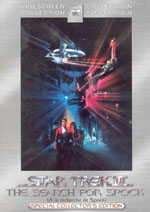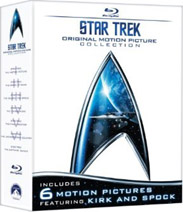
STAR TREK:
Star Trek Movies:
|
Star Trek 3: The Search for Spockwritten and produced by Harve Bennettmusic by James Horner directed by Leonard Nimoy feature film, 105 minutes
One of the really great moves of this film was in bringing back Mark Lenard to play Spock's father Sarek, and to position this role as the archetypal wise old mentor who can point Kirk and his fellow heroes onto the path they need to follow for the film's plot. This is really the first time Lenard has returned to play this role on screen since his debut in "Journey to Babel", if we look to the animated episode "Yesteryear" as an audio only contribution. Lenard does really well playing opposite Shatner and company, and with the added exposure of the feature films, he became far more strongly associated with this role and cemented himself into place as one of the fixtures of the Star Trek universe. And there's a bit of a neat new surprise in the main premise today - that Spock's soul, or to use the bits of Vulcan culture being invented on the fly here, his "katra", is sold separately. Some assembly required. Too far fetched? Well, Genesis seems far-fetched to an extent already, and I think if we can buy it in the previous film, it's actually quite closely adjacent to believe in its ability to regenerate Spock's body, and to believe that the more disciplined minds of Vulcan have mastered concepts like telepathy and soul-migration better than we Humans have currently, such that they can help things along enough to make a difference. Perhaps it challenges the atheists in the audience much more so than others, but I think it also aligns itself quite nicely with many archetypal Human myths regarding death and rebirth, and has enough established scope to get away with its main concept.
Christopher Lloyd also gets one of the biggest breaks of his career, shifting to the big screen and going straight to being the lead adversary, the Klingon Captain Kruge. And he very impressively makes a meal out of the opportunity he gets with this role. Surrounding him as fellow Klingons are some names which also rose to later fame, most notably John Laroquette playing the Klingon survivor of this tale, Maltz.
Now to be fair, there is much entertainment value in it this time around. Particularly if you're one to appreciate humour, these sequences are loaded with the best that the film has to offer, making them some of the most rewarding parts of the film. Additionally, it gives Kirk and his gang a sense of independence from Starfleet that they have never really displayed before, certainly not to this extreme extent. They manage to embody one of the more typical archetypal aspects of heroes here, an aspect that usually eludes them when they represent the establishment as they often do. Plus, we get to ditch the half-eaten shack that passed as Enterprise's drydock in the first two films, and see the debut of something far, far cooler here. Starfleet can apparently build HUGE round docking stations in space, stations capable of swallowing many starships at a time. This may not be very practical, if you think about it too hard, but boy does it ever look fantastic! Nice one. If there's a great strength to Harve Bennett's writing of this story, I would have to compliment it for being so organic in its nature. The elements all fit together quite well with each character simply moving forward according to his or her own logic. In that sense, nearly every moment feels true, and the plot escalates in believable fashion. I like the device of using the U.S.S. Grissom to introduce David and Saavik to the main location and mystery of the adventure so early on - and we are able to get some important background and intriguing hints that help draw us into the central mystery of what is happening with Spock and pull us along with it further into the story. The destruction of the Grissom itself effectively escalates the Klingon threat while displaying some additional character through their own resulting in-fighting. The novelizations of both this story and the previous one put much more detail into a romance between David and Saavik, a romance which is not really evident on screen, and one that would probably only heighten an ill-advised tragic turn that the adventure seems to have blundered into.
Additionally, to me it feels like killing off David was just a mistake by Harve Bennett. Too many avenues for exploring NEW aspects of Kirk's character were presented by David's existence and continuing presence in Kirk's relationships. All that got curtailed, and instead we substituted the inception of knives being central to Klingon culture. A pretty poor exchange in my book, and I think the biggest black mark against Bennett in terms of what he wrote for this film. It also grates against the characters' organic responses to the situation. Remember, the Klingon intends to go for Saavik instead at first, until David leaps into action and tackles him. You'd think that, with her Starfleet training and additional Vulcan strength, she might also leap to his aid, tackle the other Klingon first, and maybe deliver a good neck pinch to someone. Young Spock will eventually dispatch one of these two guard Klingons in a moment of rage - whether or not it is appropriate for him to grasp what is going on well enough to want to bring that moment forward and do it early enough to save David may be anybody's guess. As for the Enterprise crew, they will eventually get their mojo together, and the music will build up to a healthy positive tempo, and with Kirk's line "I swear to you, we're not finished yet." they'll execute a plan to save the day. So, why do they all pause, and save that moment until AFTER David dies, unless they've read ahead in the script and want to give tragedy its moment? You'd think at least one of them would be scanning the surface for life signs, getting ready to separate the Klingons from their hostages via beaming, or something. The end of David really doesn't work for me.
Some hand-to-hand phaser combat spices up the next moments on screen, as Kirk's team rescues the hostages from the Klingons. But again, it feels a bit like there isn't quite enough action happening here to satisfy the anticipation we had for confronting Klingons. Hand to hand fisticuffs ensue as the two Captains lock into a final battle for survival, something many people believed had been missing from the previous film. But good thing the planet is destroying itself all around them to spice things up, because it isn't the most interesting thing all on its own. Nothing particularly clever happens to show decisively that Kirk should be the winner here - his victory over Kruge feels a bit random and hollow. He and his gang seem far more clever and entertaining in wrapping up their rescue of Spock from the exploding planet.
Interestingly, this film seems to have set a few similar precedents in the science fiction genre - namely that death doesn't necessarily count. You can kill off a character, or even destroy a vessel, and bring him, her, or it back later on and carry on as though it was all business as usual. Such practices definitely became far more mainstream after this film series than before, via devices that were only limited by the imaginations of their writers. I think perhaps "Star Trek III" does it better than any of its imitators, in part because the concept is still fresh here, and in part because the drama of it all was milked for everything it had. Still, I do feel that perhaps science fiction in general might be better off if they gave these ideas more of a rest, and/or used them far more sparingly. There's a line at the end here that has really stuck with me over the years, as two fathers - Kirk and Sarek - sum up their views of the adventure. Sarek says, "But at what cost? Your ship. Your son." It's tempting to bring these words back in one's mind at various intervals in life, when they seem relevant. But I think the line sticks with me primarily because the powerful charisma with which Mark Lenard delivers it is so bloody pitch perfect. A healthy examination of the content might reveal the words to be a bit crap. "Cost" implies that Kirk bought his way out of his challenges, that he was somehow forced to make a trade-off... which isn't true. Had he been a bit more on the ball, he might have made a cleaner sweep of victories, saving Spock, Saavik, David, and keeping his ship intact in the process. I think it is important to remember to aim for the win-win-win-win solutions, because whatever the result, it will still turn out better this way than if you didn't remember to aim high. James Horner turns in a magnificent score for this movie... but we have to note how repetitive it seems. It's hard to put our finger on anything truly new and non-derivative here. In a sense, the music is reflecting the general content of the film, in primarily being a second helping of all the things we liked in the previous film. Indeed, many of the musical themes that began in the previous film come back and get further developed and embellished here, such that this feels much like the second-half of a single two-film score. Obviously, the main title as well as themes for Spock and Genesis are back here. Also weaved in quite prominently are a lot of bits from Alexander Courage's theme from the TV series. Even a sneaky motif for the Captain and crew of the Excelsior seems to be a variation on the opening "Space: The Final Frontier..." call from the TV series. And though we have a new Klingon theme here, the style is a direct descendent of what Jerry Goldsmith did in the first picture, with the primitive horns here seemingly unable to hold any particular pitch well enough to define a real melody. Weird. We like this score, but admit we have trouble finding a particularly strong identity for it that separates it from its predecessor. Ultimately, we wonder... How differently might this film have turned out had they had more time to refine the script prior to shooting? How differently might the structure have turned out? Is there enough flexibility to delete or tone down things we didn't like, and re-time or re-position the things that were excellent, some of which deserved expansion? If so, would the end result feel equally organic?
Our sequence of Star Trek movie reviews
Article written by Martin Izsak. Comments on this article are welcome. You may contact the author from this page:
|
||||||||||||||
|
| |||||||||||||||

LYRATEK.COM |
|
||||||||||||||










